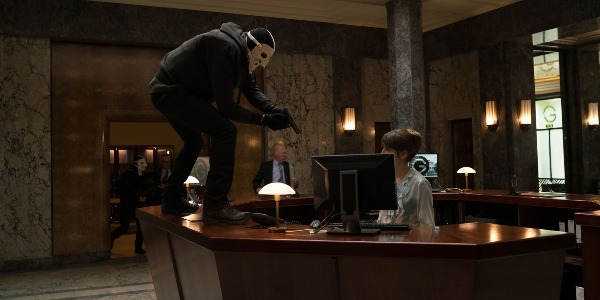RACER AND THE JAILBIRD: A Melodramatic Mess

Alistair is a 25 year old writer based in Cambridge.…
Any film attempting to balance a realist grit with a more fanciful sense of melodrama has a tough hill to climb; many filmmakers have tried, but few have managed to effectively balance these two sharply contrasting tones. Racer and the Jailbird sees Belgian director Michaël R. Roskam return to his homeland after a swiftly forgotten English language debut, 2014’s The Drop, but without the sense that he’s getting back into his comfort zone.
His previous two features (his debut, 2011’s Bullhead, was nominated for a Foreign Language Oscar) were brooding character studies set in criminal underworlds – his latest tries to balance a crime narrative firmly in his wheelhouse, with a more operatic structure that is less tethered to realism than his previous work.
A Gritty Melodrama that can’t find the right gear
And while there are sequences with the intricate, tactile style of Michael Mann, Racer and the Jailbird largely suffers because it can’t work out which tone should have the commanding voice – struggling to choose between the grit and the melodrama, and finding no way to balance them so they work in tandem. This becomes evident significantly earlier in the film than it should, with the unnecessarily overlong film proving increasingly frustrating as it plays out.
On a positive note, the lack of synchronicity between the tones does ensure the film is largely unpredictable. The downside is that this tonal inconsistency means that narrative logic is thrown out the window, with all unexpected developments feeling baffling due to the realist tone it frequently aspires towards.

Roskam’s recurring collaborator Matthias Schoenaerts stars as Gigi, a gangster who specialises in robbing banks. He meets and instantly falls in love with racing car driver Bibi (Adèle Exarchopoulos), who reciprocates his affection and doesn’t back away from the relationship even as she is informed of his criminal past and continued criminal activities. After Gigi informs her that he’s off to Poland to take care of a significant heist, things go awry, and he informs Bibi that he’s actually on the outskirts of Brussels – leading him back to the authorities, and a new attempt at becoming a changed man, stepping up to his responsibilities at home and stepping away from his former gang.
On paper, the trajectory of the story doesn’t sound too dissimilar to Derek Cianfrance’s 2012 drama The Place Beyond the Pines, which used a similar story of a bank robber trying to provide for his family as the jumping off point for a more operatic tale of criminality being passed down between generations. When Roskam’s film (co-written with Thomas Bidegain and Noé Debré) aspires to a similarly operatic sense of melodrama, it feels unearned.
The characters are as developed as the simplistic English language title would suggest, with no palatable dramatic tension in their relationship to heighten the stakes of the crimes. After all, Bibi is a rich racing driver, making it increasingly unfathomable as to why Gigi wouldn’t just quit robbing banks – but she’s supportive of him nonetheless. Every character in their orbit informed of how he makes money seems oddly blasé about it.
Coasting on the Middle of the Road
Ironically, for a film that largely focuses on the racing driver dragged into this web of criminality, Roskam’s film unfortunately gets stuck in the middle of the road; the mundanity of the home life outside of the crimes being committed creates very little in the way of dramatic tension. In the third act, the melodramatic elements are applied in a disproportionate manner to the established tone, handled in a self-serious manner that just makes their illogical nature even funnier. The screenplay was penned by three people, and I did get the sense that the three screenwriters all have very different ideas of what they wanted the film to be, and what the final product is.

There are very few redeeming factors. Schoenaerts feels like he’s stuck on autopilot, playing a sensitive criminal we’ve seen him do better before – and that’s only taking into consideration his previous collaborations with this director. Adèle Exarchopoulos fares better, although she’s handed the more melodramatic arc of the two leads, and by the third act, faces an uphill battle between sticking to the melodramatic tone and performing the increasingly unbelievable role with a sense of dignity.
After her breakout performance in Blue is the Warmest Color, a performance that Steven Spielberg’s Cannes jury awarded the Palme D’Or alongside the film’s director, her career hasn’t taken off in the way that it should. The fact that this is her most high profile role since becoming the youngest Palme D’Or winner in history speaks volumes – she’s a talented actress who has been continuously led into roles that are significantly beneath her capabilities, and this definitely isn’t the spark that will reignite her formerly promising career.
Racer And The Jailbird: Conclusion
There’s a sense of exasperation while watching Racer and the Jailbird. It’s a film with a confused sense of identity, that never figures out which direction it wants to go in – and then, after over two seemingly directionless hours, abruptly cuts to the end credits at an inconsequential moment, crossing the finishing line but providing not a shred of closure.
For a film that aspires to operatic melodrama, the ending should pack a punch that ties up all the disparate elements in a neat bow, instead of generating a mere shrug from the audience. It’s an exhausting watch; a film that never forges a true sense of character, and feels like it was rushed into production before the screenplay had even been completed.
Racer and the Jailbird is currently on limited release in the US, and will be released in the UK on July 13. All international release dates are here.
Does content like this matter to you?
Become a Member and support film journalism. Unlock access to all of Film Inquiry`s great articles. Join a community of like-minded readers who are passionate about cinema - get access to our private members Network, give back to independent filmmakers, and more.
Alistair is a 25 year old writer based in Cambridge. He has been writing about film since the start of 2014, and in addition to Film Inquiry, regularly contributes to Gay Essential and The Digital Fix, with additional bylines in Film Stories, the BFI and Vague Visages. Because of his work for Film Inquiry, he is a recognised member of GALECA, the Gay & Lesbian Entertainment Critics' Association.













